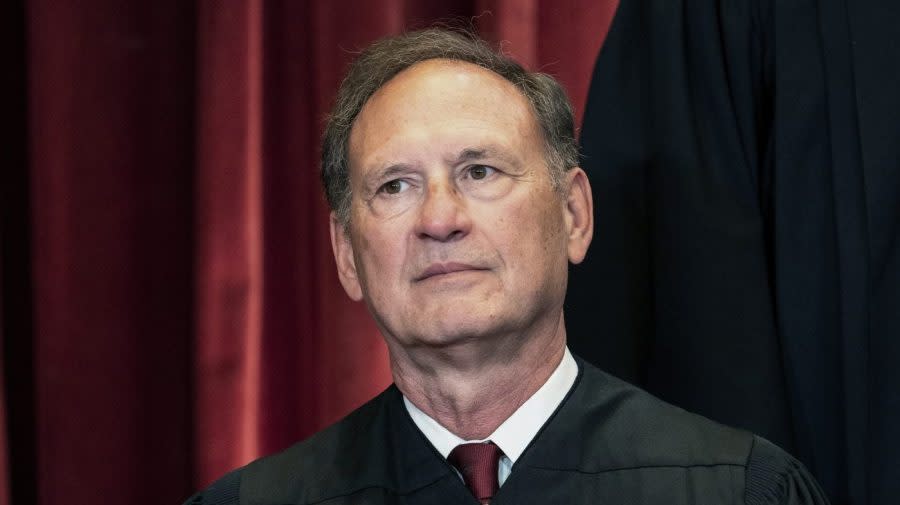Alito rejects calls to recuse from tax case after Wall Street Journal interviews

- Oops!Something went wrong.Please try again later.
- Oops!Something went wrong.Please try again later.
Conservative Justice Samuel Alito on Friday rejected calls to recuse from a major tax case after he sat down for two interviews with an attorney involved in the case.
Senate Judiciary Chairman Dick Durbin (D-Ill.) and others had called for Alito to step aside from the case after The Wall Street Journal’s opinion section published the interviews.
In the wide-ranging interviews, Alito told David Rivkin, the attorney, as well as an editor at the Journal who attended the interview that the Supreme Court bar should be defending him from recent ethics attacks and that Congress had no authority to regulate the court.
Durbin then sent a letter to Chief Justice John Roberts demanding Alito’s recusal from Rivkin’s upcoming case at the high court.
“Because this case is scheduled to be heard soon, and because of the attention my planned participation in this case has already received, I respond to these concerns now,” Alito wrote in a four-page statement Friday.
“There is no valid reason for my recusal in this case,” Alito continued.
Alito and several other justices have come under intense scrutiny in recent months as reports surfaced about undisclosed trips and other ethics controversies.
Alito regularly recuses himself from cases when he has financial investments with one of the parties. But as the recent controversies spurred demands for Alito to recuse from multiple other cases, the justice has been forcefully pushing back.
In Moore v. United States, the Supreme Court is set to decide this term whether a repatriation tax enacted as part of the 2017 Tax Cut and Jobs Act is constitutional.
Rivkin represents the plaintiffs attempting to convince the justices that the tax runs afoul of the 16th Amendment.
“Senator Durbin’s request for my recusal is presumably based on the theory that my vote in Moore will be affected in some way by the content of the articles that resulted from the interviews, but that theory fundamentally misunderstands the circumstances under which Supreme Court Justices must work,” Alito wrote.
“We have no control over the attorneys whom parties select to represent them, and as a result, we are often presented with cases in which one of the attorneys has spoken favorably or unfavorably about our work or character,” he added. “Similarly, we regularly receive briefs filed by or on behalf of Members of Congress who have either supported or opposed our confirmations, or who have made either favorable or unfavorable comments about us or our work.”
The recent ethics controversies have fueled a push among Democrats to pass a bill that would require the justices to adopt a binding code of ethics. Republicans, meanwhile, have attacked the effort as a pretext to tear down the Supreme Court’s conservative majority, giving the bill slim odds of passage.
Alito came under controversy in particular after ProPublica in June reported about an undisclosed fishing trip the justice took to Alaska in 2008, including that his private flight was provided by a billionaire hedge fund owner whose interests later came before the court.
“Justice Alito, of the originalist school of thinking that empty seats on an airplane don’t count as gifts, surprises no one by sitting on a case involving a lawyer who honored him with a puff piece in the Wall Street Journal,” Durbin pushed back in a statement later Friday. “Why do these Justices continue to take a wrecking ball to the reputation of the highest court in the land?”
The justice has denied any wrongdoing and insisted he was not required to disclose the trip. In his later interview with Rivkin at the Wall Street Journal, Alito called recent stories about him “nonsense.”
In his Friday statement, Alito said there was “nothing out of the ordinary” about the interviews, noting that other justices have participated in interviews with media outlets who have had cases come before the high court.
“Similarly, many of my colleagues have been interviewed by attorneys who have also practiced in this Court, and some have co-authored books with such attorneys. Those interviews did not result in or require recusal,” he wrote.
Updated: 4:26 p.m. ET
For the latest news, weather, sports, and streaming video, head to The Hill.

